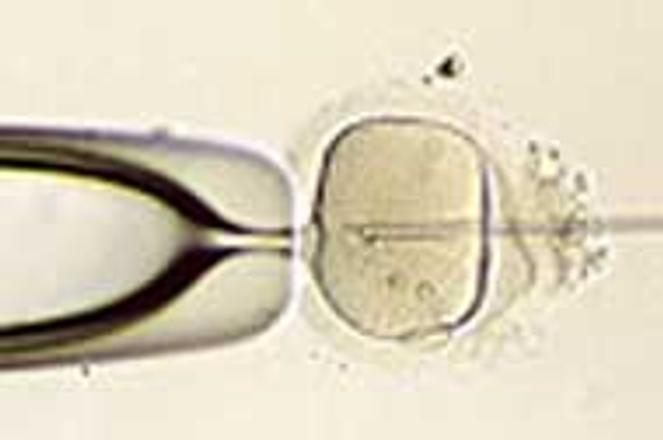Intracytoplasmic sperm injection. A tiny pipette (from right) injects a single sperm (appearing as an extension off the bottom side of the pipette's tip) into the egg.photo: Courtesy Iscare
Silvia Veľká (30) has spent the last 12 years with ovarian cysts, a condition which had made it impossible for her to bear children. Frustrated by her apparent infertility, she went to Iscare, an Israeli firm with a centre in Bratislava which specialises in "assisted reproduction" through artificial insemination.
Today, Veľká can hardly mask her euphoria - she's pregnant. "I never imagined I'd be able to have children," she said ecstatically shortly after learning of her pregnancy in June. "I'm so happy, and my husband is incredibly happy, too."
Veľká underwent a process known as in vitro fertilisation (IVF), explained by Iscare gynaecologist Jozef Valky as the "basic procedure" of taking a woman's egg and a man's sperm, placing them under a microscope and waiting for natural fertilisation to occur. If successful, the fertilised egg is placed in an incubator for maturation.
The doctor then prepares the woman for the embryo transfer "when the lining of the uterus is ripe for implantation, three weeks after the last menstruation", Valky explained. The embryo is inserted into the uterus with a 34% success rate of impregnation at the Bratislava centre.
Iscare launched operations in Slovakia on October 15, 1999. Through their assisted reproductive techniques to date, triplets, twins, and now the first single baby (on July 7) have all been born. Iscare Deputy Director Mar'na Hrušecká said that the centre currently has 752 patients, 82 of whom have been impregnated. All are couples who, she said, had previously given up all hope of having their own children.
"These women need some help and normal doctors in state hospitals cannot help them," Hrušecká said. "At a certain age women feel the need to become mothers, this is a natural force. The feeling is so strong that they would do anything to fulfil it."
But Iscare officials said that the future of the centre was under threat because the Slovak government would not create more favourable investment conditions for the firm. Nadav Lasser, Iscare co-director and Israeli shareholder representative, said that although the country has trumpeted its FDI ambitions, doing business in Slovakia remained difficult.
The Health Ministry, he explained, has refused the foreign firm admittance to the Ministry's Health Net, a group of ministry-recognised medical companies which can provide services all or partially covered by insurance. Although they have repeatedly requested membership, the ministry has not yet permitted Iscare to join.
"We have no idea why they won't accept us," Lasser said. "Because of the relatively high cost of our service [between 35,000 to 45,000 Slovak crowns per couple ($777 to $1,000)], we need to be on the [Health] net, but to be on the net we need approval from the Ministry." Lasser added that the mother company in Israel had so far invested "tens of millions of crowns" into Slovakia.
Blanka Hercaková, from the ministry's health care section, said that no new firms had been allowed onto the Health Net since January 1999, as the ministry was rebuilding the nation's health care system. The project would be finished by 2002, she said, although she would not say if firms would be allowed onto the net before completion, nor would she speculate on Iscare's future status.
"Giving water"
Valky said that the centre only worked with couples, rather than single women seeking to become single mothers. The couples are first given extensive medical examinations to determine the reproduction problem. At the Bratislava centre, Valky said that 70% of all problems were the result of the male's poor sperm.
In such cases, he said, a simple surgical procedure was performed in which a tiny pipette is used to inject a single sperm (sometimes removed from the man's testes in cases of extreme sperm dysfunction, referred to as the 'male factor'), into the awaiting egg, a process of assisted fertilisation known as Intracytoplasmic sperm injection (ICSI). The process differs from IVF in that doctors actively join the egg and sperm during ICSI - Valky added that ICSI was usually employed to make up for sperm deficiencies while IVF tended to overcome problems with the egg (the so-called 'female factor').
If the male's sperm are totally dysfunctional, Valky continued, a donor was selected from Iscare's sperm bank. The donor sperm is selected based on physical and genetic matches between the donor and the legal father.
The two processes of Intracytoplasmic sperm injection and in vitro fertilisation, said Hrušecká, were providing a worthy service to women who had previously abandoned their dreams of motherhood: "The service we provide is vital. It's like if you are thirsty, we can give you water."


